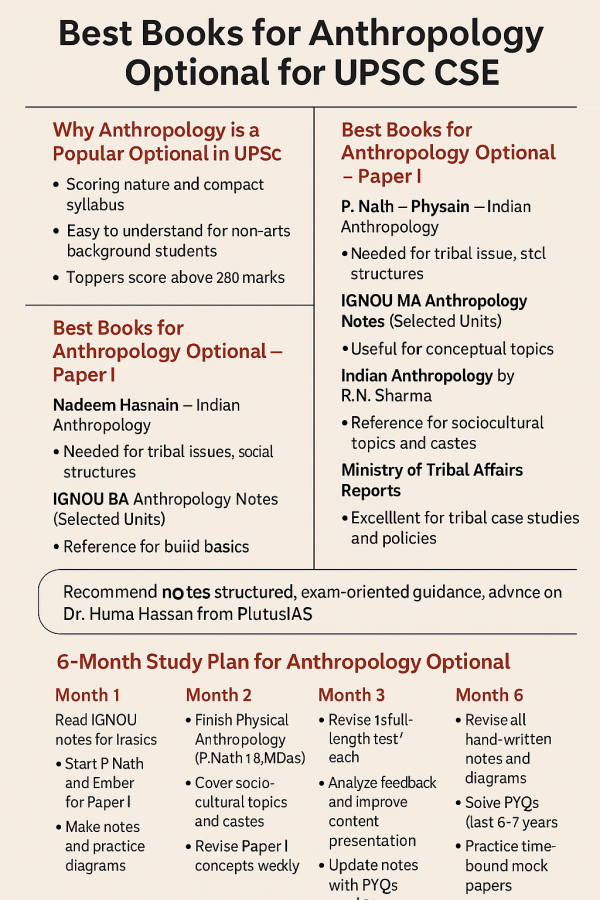Why Anthropology is a Popular Optional in UPSC
Anthropology has emerged as one of the most preferred optional subjects for UPSC CSE due to its scoring nature, compact syllabus, and ease of understanding even for non-arts background students. Many toppers, including medical and engineering graduates, have chosen Anthropology and scored above 280 marks.
Best Books for Anthropology Optional – Paper I
Paper I deals with General Anthropology, including physical, social, archaeological, and linguistic anthropology. The following books are essential:
- P. Nath – Physical Anthropology
A concise and exam-oriented book for biological anthropology with illustrations and diagrams. - Ember & Ember – Anthropology
A comprehensive guide to social and cultural anthropology, useful for conceptual clarity. - IGNOU BA Anthropology Notes
Recommended for beginners to build foundational knowledge. - B.M. Das – Outlines of Physical Anthropology
Reference for human evolution, race, and genetics with scientific explanations.
Best Books for Anthropology Optional – Paper II
Paper II covers Indian Anthropology – focusing on tribal issues, caste, village studies, social institutions, and thinkers. Here are the most effective resources:
- Nadeem Hasnain – Indian Anthropology
A must-read for Indian tribal issues, social structures, and ethnographic details. - IGNOU MA Anthropology Notes (Selected Units)
Useful for paper-specific conceptual topics. - Indian Anthropology by R.N. Sharma
Supplementary reference book for sociocultural topics and caste systems. - Ministry of Tribal Affairs Reports
Excellent for case studies, policies, and current data on Indian tribes.
Recommended Notes and Mentorship
If you’re looking for structured, exam-oriented guidance, Dr. Huma Hassan from PlutusIAS is considered one of the best mentors for Anthropology optional. Her notes, especially on biological anthropology and tribal case studies, are widely trusted among toppers.
6-Month Study Plan for Anthropology Optional
Here’s a practical and time-tested study plan to help you cover the entire Anthropology syllabus in 6 months:
Month 1: Foundation
- Read IGNOU notes for basics
- Start P. Nath and Ember & Ember for Paper I
- Make notes and practice diagrams
Month 2: Deep Dive into Paper I
- Finish Physical Anthropology (P. Nath + B.M. Das)
- Cover socio-cultural topics from Ember & Ember
- Start Paper I answer writing
Month 3: Begin Paper II
- Start Indian Anthropology with Nadeem Hasnain
- Study tribal issues, caste system, village studies
- Revise Paper I concepts weekly
Month 4: Integrate Diagrams and Case Studies
- Compile tribal case studies from ministry reports
- Use diagrams extensively in Paper I and II answers
- Join test series (e.g., PlutusIAS)
Month 5: Test Practice
- Write one full-length test each week
- Analyze feedback and improve content presentation
- Update notes with PYQs and model answers
Month 6: Final Revision
- Revise all handwritten notes and diagrams
- Focus on PYQs (last 5–7 years)
- Practice time-bound mock papers
Topper Tips to Maximize Marks in Anthropology
- Draw diagrams wherever possible – even in socio-cultural questions
- Use keywords from thinkers and theories
- Revise definitions, tribe-specific case studies, and government schemes
- Structure your answers into clear points with headers and subheaders
Conclusion
Anthropology is not just a scoring optional subject but also one that helps you understand human behavior, culture, and society from a scientific lens. With the right books, strategic planning, and expert mentorship, you can ace this subject and boost your UPSC Mains score significantly.
Choose your resources wisely, revise regularly, and practice answer writing with commitment—and success will follow.
« Which coaching institutes provide the best GS modular coaching in old Rajinder Nagar, New Delhi?

